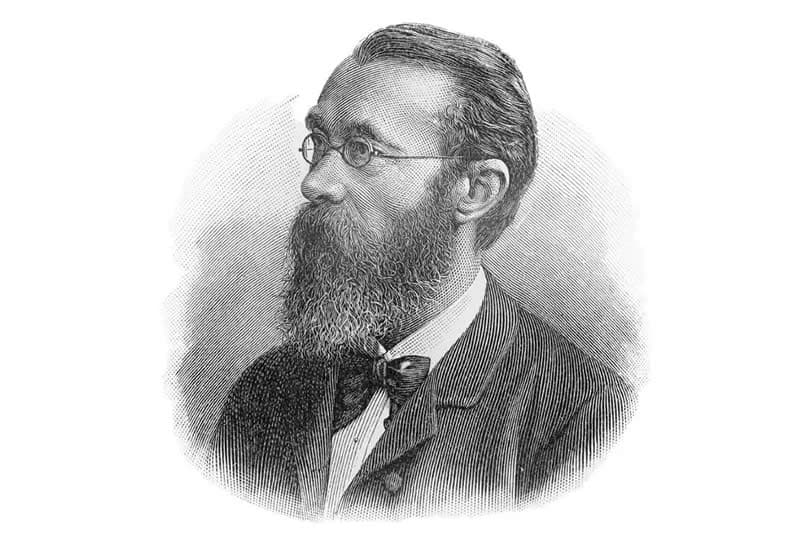The early years
Who is the father of psychology? Wilhelm Wundt (Father of Psychology) was born on August 16, 1832, in the small German town of Neckarau, close to Mannheim. His father, Maximilian Wundt, a Lutheran pastor, and his wife, Maria Frederika, raised him in a family that encouraged scientific curiosity. Both his father and grandfather were passionate scientists, and they passed on their desire for knowledge and discovery to young Wilhelm.
Journey towards science
Wundt started his education at the University of Tübingen, studying medicine. Throughout his studies, he moved to the University of Heidelberg and eventually graduated from Humboldt University in Berlin. Here, he met leading scientists and philosophers of his time, which allowed him to expand his knowledge and interests in the fields of philosophy and psychology.
Meeting Helmholtz
After completing his medical degree, Wundt began working as an assistant to Hermann von Helmholtz, one of the most prominent physiologists of the 19th century. This collaboration led Wundt to explore the relationship between physiology and psychology, which became the foundation of his future career.
Pioneering step
Gradually focusing on psychology, Wundt founded the first psychological laboratory at the University of Leipzig in 1879. This laboratory was a groundbreaking step that separated psychology from philosophy and laid the groundwork for experimental psychology as an independent scientific discipline.
Research ground in Leipzig
While at Leipzig, Wundt focused on studying fundamental psychological processes, such as perception, attention, and memory. He employed systematic introspection, which involved careful and controlled examination of one’s own thoughts and perceptions. He also designed a series of experiments based on physiological measurements.
Legacy of the father of modern psychology
Wundt’s work and innovations in methodology and approach to psychological research earned him the title of the father of modern psychology. His efforts contributed to the recognition of psychology as an independent scientific discipline and inspired future generations of researchers. By creating the first psychology-focused laboratory and training hundreds of students, Wundt laid the foundations for the development of experimental psychology worldwide.
Decomposing the mind into parts
Wundt developed a theory he called “structural psychology”. This theory focused on breaking down the mind into its fundamental components, such as individual perceptions and emotions. Wundt believed that by analyzing these basic components, we could better understand how the human mind functions as a whole. This approach influenced the further development of psychology, particularly in the areas of behaviorism and cognitive psychology.
Seeking philosophical roots
In addition to his work in psychology, Wundt also developed his philosophical ideas and created a system called “voluntarism”. This system emphasized the importance of will and intention in human behavior and thinking, setting it apart from other philosophical schools of his time. Voluntarism also stressed that psychological processes are active and dynamic, which later became the basis for other theories and research in psychology.
Who is the father of psychology? (books)
Wundt was a prolific author, and throughout his career, he wrote many books and articles. His most famous work, “Principles of Physiological Psychology” (Grundzüge der physiologischen Psychologie), was first published in 1874 and introduced the basic concepts and methods of his research. In addition to this work, he also wrote the book “Logic” (Logik) and a multi-volume work “Ethics” (Ethik), which showcase the breadth of his interests and expertise.
Spreading ideas
Wundt’s ideas and theories gained many followers, and his laboratory in Leipzig became a magnet for young psychologists from around the world. Many of them later became prominent figures in the field, such as Edward Titchener, G. Stanley Hall, and Charles Spearman. Wundt’s students and colleagues helped disseminate his ideas and methods, thus contributing to shaping modern psychology.
Wilhelm Wundt’s books on Amazon.com.
Where to next?
Unraveling the Legacy of Wilhelm Wundt: Father of Psychology part I.
Wilhelm Wundt’s Books: Foundational Works Shaping the Field of Psychology
Unraveling the Basics of Structural Psychology: Wilhelm Wundt’s Influence
Unveiling Behaviorism: A Simple Guide to Understanding Human Actions






